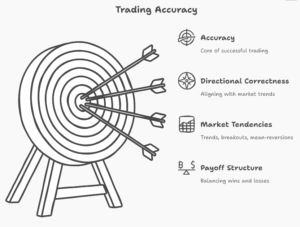In buying and selling, survival isn’t about predicting the market with flawless foresight. As an alternative, it typically is dependent upon the way you body danger, execute constantly, and permit chance to work in your favour. Two concepts which are incessantly confused—however vitally necessary to differentiate—are precision and accuracy. They sound comparable, but for merchants, they symbolize totally completely different abilities.
Accuracy: Being Proper on Common
 Accuracy is about being directionally right. An correct dealer locations trades that broadly align with the eventual consequence of the market. In the event you’re correct, your system captures real market tendencies: traits that proceed, breakouts that maintain, and mean-reversions that happen. Accuracy doesn’t demand perfection—it merely signifies that over a big sufficient pattern, you’re extra typically proper than improper, or not less than proper often sufficient relative to your payoff construction.
Accuracy is about being directionally right. An correct dealer locations trades that broadly align with the eventual consequence of the market. In the event you’re correct, your system captures real market tendencies: traits that proceed, breakouts that maintain, and mean-reversions that happen. Accuracy doesn’t demand perfection—it merely signifies that over a big sufficient pattern, you’re extra typically proper than improper, or not less than proper often sufficient relative to your payoff construction.
For instance, in case your system predicts breakouts and 45% of them flip into sustained strikes, you is probably not “typically” right, however the winners are giant sufficient to offset the losers. That’s accuracy at work. Accuracy lives on the stage of the edge: does your strategy tilt the chances in your favour? It’s not about successful each battle, however about aligning with the market’s underlying forces incessantly sufficient to outlive and thrive.
Precision: Hitting the Similar Mark Repeatedly
 Precision, in contrast, is about consistency in execution. A exact dealer applies their guidelines in the identical method, commerce after commerce, no matter consequence. They measurement positions in accordance with plan, set stops at predetermined ranges, and enter solely when their system’s circumstances are met.
Precision, in contrast, is about consistency in execution. A exact dealer applies their guidelines in the identical method, commerce after commerce, no matter consequence. They measurement positions in accordance with plan, set stops at predetermined ranges, and enter solely when their system’s circumstances are met.
Consider precision because the talent of capturing arrows that at all times land shut to 1 one other, even when they aren’t proper on the bullseye. In buying and selling phrases, you might need three shedding trades in a row, however should you took them in accordance with your guidelines, sized them appropriately, and adopted exits to the letter, your course of was exact. Precision ensures that the randomness of markets doesn’t spiral into chaos in your outcomes.
With out precision, accuracy can’t specific itself.
A technique might have a 55% win charge, but when the dealer hesitates, skips alerts, or doubles place measurement on a whim, that edge evaporates. Precision retains you within the sport lengthy sufficient for accuracy to indicate its worth.
Why the Distinction Issues
The seductive lure for merchants is chasing accuracy whereas neglecting precision. New merchants obsess over being “proper,” continuously tweaking methods or including indicators to enhance entry factors. But with out precision—trustworthy, disciplined execution—the accuracy of any system is meaningless.
Skilled merchants flip the emphasis. They construct mechanical methods or clear rule-sets to take care of precision. Accuracy is seen as a long-run phenomenon, revealed solely after tons of of trades. They settle for that short-term randomness typically disguises accuracy and as a substitute put their power into controlling what they’ll: constant execution.
The Dealer’s Takeaway
-
Accuracy is about whether or not your system captures actual market tendencies.
-
Precision is about whether or not you execute that system faithfully.
-
Accuracy determines your edge. Precision determines whether or not you realise that edge.
In buying and selling, it’s higher to be exact with a median system than sloppy with a superb one. Over time, precision builds the steady basis that enables accuracy to compound into earnings.
Put up Views: 941

